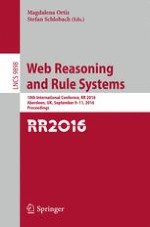2016 | Buch
Web Reasoning and Rule Systems
10th International Conference, RR 2016, Aberdeen, UK, September 9-11, 2016, Proceedings
herausgegeben von: Magdalena Ortiz, Stefan Schlobach
Verlag: Springer International Publishing
Buchreihe : Lecture Notes in Computer Science
